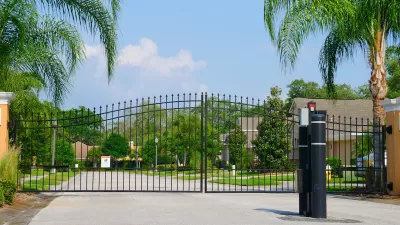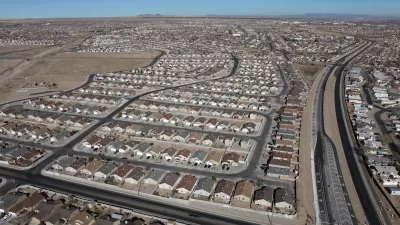Explicitly racist and exclusionary language remains embedded in many communities' restrictive covenants. State legislators and local leaders want to change that.

Although race-based restrictive covenants were rendered unenforceable by the 1968 Fair Housing Act, communities across the country linger in the shadow of their legacy as the language restricting residency remains in many property deeds. Wufei Yu reports on racial covenants in Albuquerque, where mid-century deed restrictions kept Black and Latino residents from buying homes in many parts of the city.
While "some Albuquerque title companies omitted restrictions based on race, color or national origin, scrubbing the racist language from their covenants," many kept the language in its original form. "In March, High Country News reviewed 10 property deeds in historically white neighborhoods closings and found that four of them still included racially offensive language from the city’s segregated past." Despite New Mexico's multiethnic origins—by 1920, the state was "home to nearly 6,000 African Americans, about 500 Asian Americans and over 19,000 Indigenous people"—a backlash against minorities led to the adoption of the "Alien Land Law" in 1921, which "barred people of Asian descent from owning and leasing real estate." The Alien Land Law wasn't removed from the state's constitution until 2006.
Today, "state Senators Daniel Ivey-Soto and Jerry Ortiz y Pino are drafting a bill that would encourage the removal of all racial covenants," calling the language a dangerous precedent for "viciously racist" policies like the 1882 Chinese Exclusion Act.
FULL STORY: Albuquerque’s racist history haunts its housing market

Maui's Vacation Rental Debate Turns Ugly
Verbal attacks, misinformation campaigns and fistfights plague a high-stakes debate to convert thousands of vacation rentals into long-term housing.

Planetizen Federal Action Tracker
A weekly monitor of how Trump’s orders and actions are impacting planners and planning in America.

In Urban Planning, AI Prompting Could be the New Design Thinking
Creativity has long been key to great urban design. What if we see AI as our new creative partner?

King County Supportive Housing Program Offers Hope for Unhoused Residents
The county is taking a ‘Housing First’ approach that prioritizes getting people into housing, then offering wraparound supportive services.

Researchers Use AI to Get Clearer Picture of US Housing
Analysts are using artificial intelligence to supercharge their research by allowing them to comb through data faster. Though these AI tools can be error prone, they save time and housing researchers are optimistic about the future.

Making Shared Micromobility More Inclusive
Cities and shared mobility system operators can do more to include people with disabilities in planning and operations, per a new report.
Urban Design for Planners 1: Software Tools
This six-course series explores essential urban design concepts using open source software and equips planners with the tools they need to participate fully in the urban design process.
Planning for Universal Design
Learn the tools for implementing Universal Design in planning regulations.
planning NEXT
Appalachian Highlands Housing Partners
Mpact (founded as Rail~Volution)
City of Camden Redevelopment Agency
City of Astoria
City of Portland
City of Laramie





























